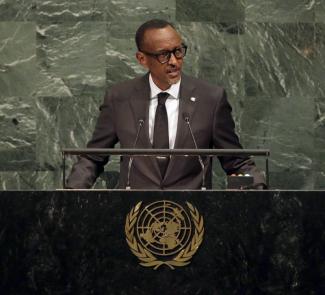African Union
Wrong chairman

The DRC was supposed to hold elections last year. They were postponed to December this year. People wonder whether they will actually take place (see Christoph Vogel in D+C/E+Z e-Paper 2018/02, p. 26). Many assume that President Joseph Kabila will try to cling to power, disregarding constitutional principles. Violence is erupting in various places, including, for example, the Ituri region.
In situations like this, international organisations should play a moderating role. They should put pressure on governments to accept the rule of law und respect human rights. The Economic Community of West African States has been setting the right kind of examples in recent years (see Vladimir Antwi-Danso in D+C/E+Z e-Paper 2018/02, p. 22). Unfortunately, other regional organisations have kept endorsing autocrats, and the Kagame-led AU is unlikely to change its stance.
For two reasons, Kagame cannot be considered an honest broker in the DRC. The first reason is his history of sponsoring militias that are involved in the neighbouring country’s power struggles. Rwanda, moreover, is known to benefit from exporting natural resources that were mined in the DRC. Kagame thus lacks the disinterestedness he would need to be a convincing leader of any diplomatic intervention.
The second problem is his history of authoritarian governance at home. He set a bad example by insisting on constitutional changes to allow him yet another term in office. He then won the presidential election with almost 98 % of the vote last year. Such figures are implausible in a competitive democracy. The truth is that Rwanda is a police state which curtails the freedoms of expression and association. According to Human Rights Watch, journalists are harassed, people are detained illegally and some are tortured.
Nonetheless, many observers argue that Kagame is the right person to lead the AU. To some extent, their arguments are sound. It is true that Kagame is not the typical African strongman who uses power to exploit the country and enrich his family and friends. Kagame has a healthy understanding of economic development, and Rwanda has been prospering under his rule. After the horrific genocide in 1994, he rose to power as a victorious militia leader who ended the civil war, and some experts give him credit for reuniting his nation. He thus has the reputation of being a good administrator committed to the common good.
His technocratic competence may indeed do the AU good. Its head office was wiretapped by China, which had built the facility. This embarrassing fact was kept secret for months. An international organisation must obviously do a better job of shielding itself. An efficient administrator like Kagame might indeed make the difference.
Africa definitely needs more intra-African trade moreover. Kagame understands these issues, and perhaps he can speed up the AU’s Continental Free Trade Area. He has earned the respect of donor governments and has been a powerful voice for pan-African interests in global affairs.
That said, Kagame’s faim as a peacebuilder in Rwanda is exaggerated. The truth is that, under Kagame’s authoritarian regime, there are public rituals of remembrance, but differences between Hutus and Tutsis may not be mentioned. He insists that the distinction, which led to such terrible bloodshed, no longer exists. If people are not free to share their experiences, define their identities and express their views on such sensitive matters, a nation cannot come to terms with its history. Reconciliation depends on mutual understanding, not on keeping silent.
Kagame is certainly a better choice for the AU leadership than Robert Mugabe, Zimbabwe’s recently ousted strongman, was three years ago. Mugabe had none of Kagame’s merits, but all of his flaws. Unfortunately, Kagame too has proven to be a ruthless leader who is determined to stay in power at any cost. This attitude is harmful. It is certainly not what Africa needs.
Hans Dembowski is the editor-in-chief of D+C/E+Z.
euz.editor@fazit-communication.de








